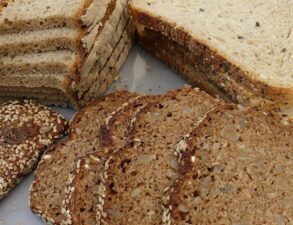 Are you feeling torn between having a low or high carbohydrate diet?
Are you feeling torn between having a low or high carbohydrate diet?
Carbohyrate is a macronutrient found mostly in plant-based foods such as breads and cereals and fruit and vegetables. Carbohydrate provides us with energy, dietary fibre and a host of vitamins and minerals to keep us active and healthy.
How much carbohydrate you need for good health depends on your energy needs, your age, level of activity and personal health goals and all these things change over time.
Why is carbohydrate important for good health?
Most Dietitians recommend that if you are needing to lose/gain weight, control blood pressure, reduce insulin resistance, diabetes, PCOS or heart disease then controlling the type and amount of carbohydrate rather than cutting it out, can provide many benefits:
1. Energy and blood sugar control
- How quickly the body is able to digest, absorb and metabolise carbohydrate foods can be determined by their glycaemic index(GI) ranking
The GI is a physiologically based measure of the effect of carbohydrates on our blood glucose levels (BGL). Tested carbohydrate foods are given a score on a scale of 1-100.
Foods with a score of 55 and under are low GI which are metabolised more slowly than higher GI foods, giving us sustained energy and helping us maintain a healthy body weight. The GI of foods is regularly being tested if you would like to find out moreA new report has just been released by the Glycaemic Index Foundation listing all the benefits of eating low GI carbohydrate foods including unexpected things such as improved eye and skin health, better cognition and pregnancy out comes. This organisation has also set up a certification symbol to guarantee that the GI ranking of a food has been reliably tested. - Once eaten carbohydrate that is not cirulating in the blood stream is stored as glycogen in your muscles thereby providing a backup supply of energy which can be converted back into glucose when needed such as when needs increase during exercise.
- Learning how to control and leverage your carbohydrate intake to suit your energy use can greatly improve stamina and performance at home and work and during training and competition.1
2. Better gut health
Low GI carbohydrate foods are an important source of dietary fibre that helps to lower cholesterol, reduce weight and maintains the healthy probiotic gut bacteria (microbiome) that aid digestion, gut and brain health and builds your immune system.2
3. Stronger muscles and bones
Carbohydrate provides a steady stream of energy to enable protein rich foods to be used for tissue and bone growth and for muscle building, repair and adaption after exercise.4
4. Reduces cardiovascular health risks
Controlling carbohydrate intake can help to lower body weight, insulin resistance and blood pressure and to improve blood cholesterol by lowering total cholesterol, LDL and triglyceride levels whilst raising the healthy HDL cholesterol.4
5. Improves iron absorption
Whole grain bread and cereals along with green vegetables are an important source of iron in the diet 5 and the vitamin C found in raw fruits and vegetables aids iron absorption.
Very low carbohydrate diets lack many of these nutrients including B Group vitamins, Beta-carotene (important for Vitamin A) calcium, selenium and magnesium important for your optimal nerve and mental health.
6. Reduces inflammation
Most carbohydrate rich foods are good sources of antioxidants and polyphenols that aid immunity and reduces the inflammation 6 often associated with obesity, diabetes, arthritis, and some forms of cancer. The Mediterranean Diet is a rich source of these anti-inflammatory nutrients that are found in olive oil, wholegrains, fruit and vegetables, nuts and seeds, tea and coffee etc.
Confusion reigns in the market place
A lot of confusion regarding the safety of eating carbohydrate can be tracked back to 2015 when the World Health Organization (WHO) recommended that free sugars should be reduced from 12 teaspoons per person/ day to no more than 6 teaspoons (which is around 5% of our total energy intake).7
Free sugars are defined as mono and disaccharides that are added to food by manufacturers, cooks and consumers plus some sugars naturally present in foods such as white sugar, honey, syrups and fruit juice.
The Australian and NZ Dietary Guidelines went one step further in 2017 and recommended that we also reduce our intake of highly processed foods that contain added sugar but are of limited nutritional value such as biscuits, cakes, potato crisps, corn chips, rice crackers, chocolate, confectionary (Lollies), sugar sweetened beverages (SSB’s) and fruit juice.8
There is no argument. Limiting added sugar will greatly reduce the risk of obesity, diabetes, and dental caries.
Unfortunately, the food labels in Australia and NZ list the total carbohydrate content followed by the grams of sugar present. However, they don’t specify if the sugar present is naturally occurring in the food (such as fructose in fruit or lactose in the milk which are healthy) from that which is added such as sucrose during manufacture. So, people often see the word sugar and assume that the whole product containing carbohydrate is therefore ‘bad’ for their health.
What does carbohydrate control mean?
As mentioned earlier, the amount of carbohydrate that we need depends on our total energy needs. A nutritional assessment by a Dietitian can help you determine how many calories/kilojoules you need each day along with the best balance of carbohydrate, protein and fat (in grams) to deliver good health.
Initially learning how to understand food labels and how to bundle carbohydrate and protein into portions not only helps with weight management (loss and gain) but also ensures sufficient energy is attained for day-to-day activity and during times of increased need. Such as for growth, pregnancy, sports training and competition and if undertaking extra heavy work.
NB: This doesn’t mean that you will have to count portions for the rest of your life or be on a ‘diet’ but it will give you a reference point to go back to if ever your needs change and can provide you with a better appreciation of food value.
Do contact me if you would like to learn more.
Other articles by Lea on similar topics
Dietary guidelines are constantly changing are they still relevant?
How to make the most of a plant-based diet
Are you eating enough for build strength?
8 tips to help break the sugar habit
Time your eating for better performance
References
- Burke, L., Deakin, V., Clinical Sports Nutrition (4th ed.), 2010, McGraw Hill.
- Mu, Q., Kirby, J., Reilly, C.M., Luo, X.M., ‘Leaky gut as a danger signal for autoimmune disease’, Frontiers in Immunology, 2017, https://www.frontiersin.org/articles/10.3389/fimmu.2017.00598/full.
- Ivy J, Rgulation of muscle glycogen repletion, muscle protein synthesis and repair following exercise. J.Sport.Sci.Med 2004. Sept 3 (3) 133-134.
- 4.Feinman, RD. et al Dietary carbohydrate restriction as the first approach in diabetic management: Critical review and evidence base. Nutrition Vol 31, Issue 1, Jan 2015:1-13. https://www.sciencedirect.com/science/article/pii/S0899900714003323
- 5 McKay A.K.A, Pyne D.B, Burke L.M, Peeling.P, Iron nutrition: Interaction with energy and carbohydrate availability. Nutrients 2020 Dec,12 (12).3192.
- Nani.A et al, Antioxidant and anti-inflammatory potential of polyphenols contained in Mediterranean diet in obesity: molecular mechanism. Molecules 2021 Feb:26(4):985.
- 7.WHO calls on countries to reduce sugar intake among adults and children 2015 https://www.who.int/news/item/04-03-2015-who-calls-on-countries-to-reduce-sugars-intake-among-adults-and-children
- 8 Discretionary food and drink choices’, Eat for Health, 16 May 2017, https://www.eatforhealth.gov.au/food-essentials/discretionary-food-and-drink-choices































































Leave a Reply